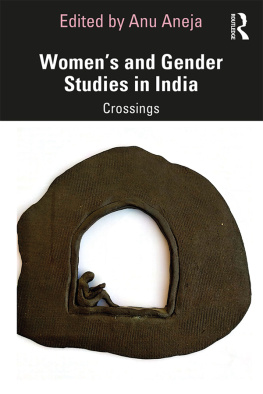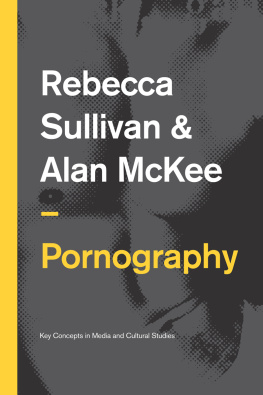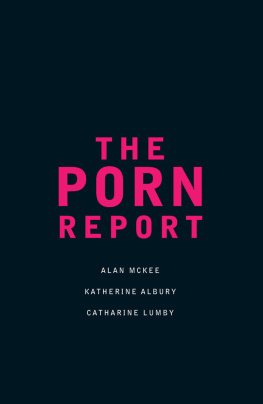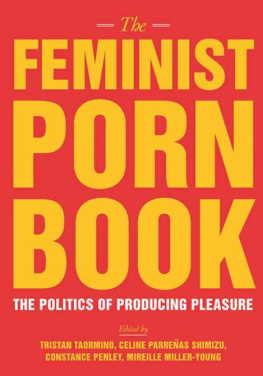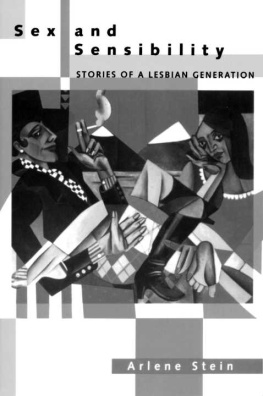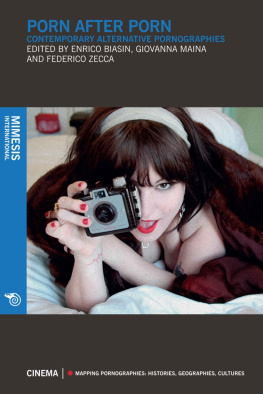EXPLICIT UTOPIAS
EXPLICIT UTOPIAS
Rewriting the Sexual in Womens Pornography
AMALIA ZIV
Published by State University of New York Press, Albany
2015 State University of New York
All rights reserved
Printed in the United States of America
No part of this book may be used or reproduced in any manner whatsoever without written permission. No part of this book may be stored in a retrieval system or transmitted in any form or by any means including electronic, electrostatic, magnetic tape, mechanical, photocopying, recording, or otherwise without the prior permission in writing of the publisher.
For information, contact State University of New York Press, Albany, NY
www.sunypress.edu
Production, Jenn Bennett
Marketing, Anne M. Valentine
Library of Congress Cataloging-in-Publication Data
Ziv, Amalia.
Explicit utopias : rewriting the sexual in womens pornography / Amalia Ziv.
pages cm
Includes bibliographical references and index.
ISBN 978-1-4384-5709-3 (hardcover : alk. paper) ISBN 978-1-4384-5710-9 (e-book) 1. PornographySocial aspects. 2. Feminism. 3. Feminist theory. I. Title.
HQ471.Z58 2015
306.77dc23
2014031755
10 9 8 7 6 5 4 3 2 1
For my parents, Tova and Gideon Ziv
Contents
Illustrations
Acknowledgments
M any people have contributed to the formation of this book in various stages of its evolution.
The impetus for this project dates as far back as my graduate studies at Brown University, where I became preoccupied with the question of female sexual subjectivity in pornography and began to explore it in courses I took with Carolyn Dean and Henry Abelove. Carolyn Deans class The History of Pornography was especially formative and laid out the foundations of my knowledge and thinking on the subject. I am indebted too to Hannan Hever, who agreed to advise a dissertation on this topic at Tel-Aviv University and helped me structure the project. Special thanks go to Mandy Merck, who generously shared with me her knowledge and scholarship and commented on drafts of an early version of this work. David Halperin, whose work has been a constant source of inspiration and a model of scholarly rigor, and whose support and encouragement throughout my academic path I have deeply cherished, helped me think through some key issues, offered exacting criticisms, and made valuable bibliographic suggestions. Gayle Rubin not only shared with me some of her thoughts on lesbians adoption of aspects of the gay male sex culture and suggested important references but also showed extreme kindness in sending me hard-to-obtain texts. Lynne Segal provided very valuable feedback and important pointers for bringing the manuscript up to date. Sarah Schulman engaged with the text in a collegial spirit, offering both competing perspectives and encouragement. I would also like to thank the two anonymous readers for State University of New York Press, who offered exacting criticisms and useful suggestions for revision. I am grateful to my editor, Beth Bouloukos, for her belief in this book project and for efficiently shepherding it through the long and winding road to publication. Finally, my colleague Catherine Rottenberg provided much needed support, advice, and practical assistance in bringing this project to completion, and I am grateful for her friendship and collegiality. I am indebted to all these people for their various contributions to this book, while assuming sole responsibility for its failings.
I am also thankful to Ingrid Ryberg for very kindly allowing me to use a still from her short film Phone Fuck that forms part of the Dirty Diaries project (Mia Engberg, 2009) on the cover of this book. Annie Sprinkle, Nan Kinney, and Buck Angel graciously gave permission to reproduce images from their films, as did Jae Carranza on behalf of the estate of the late Christopher Lee. I am obliged to all of them.
This is the place to acknowledge also the intellectual and moral support of my friends and colleagues both at Tel-Aviv University and Ben-Gurion University: Orly Lubin with her characteristic generosity has provided continual encouragement, mentoring, and assistance; Aeyal Gross is a partner in an ongoing intellectual dialog as well as in academic activism; Dafna Hirsch and Merav Amir could always be relied upon to provide perceptive criticism. I thank them all, as well as the other members past and present of the TAU forum for LGBT studies and queer theory for their camaraderie. I also thank my newer friends and colleagues at BGU for their friendship, support, and encouragement: Henriette Dahan Kalev, Niza Yanay, Amnon Raz Krakotzkin, Maya Lavie Ajayi, and of course Catherine Rottenberg.
Special gratitude is owed to my students past and present, whose interest keeps reviving my own passion for what I teach. This book is particularly indebted to the students of my seminar on pornography, who could always be depended on to bring me up to date on developments in the field. Throughout the years, I have presented sections of this book in numerous academic conferences and seminars, as well as in nonacademic forumsfar too many to acknowledge here and I am thankful to all those who engaged with my ideas and whose comments, questions, and challenges contributed to my thinking on these subjects.
Last but not least, I thank my partner Sharron Hass for putting up with this project, nearly as long as our relationship, throughout its various incarnations.
During this books final stages of production my father, Gideon Ziv, passed away. I cannot begin to list the numerous ways in which he had shaped my intellectual formation. It is from him that I acquired the passion for literature as a site of both knowledge and adventure, as well as the fascination with the transgressive. Had he lived to see this book, I believe he would have greeted it with amused satisfaction.
An earlier Hebrew version of draws on the article Girl Meets Boy: Cross-gender Queer Sex and the Promise of Pornography, published in Sexualities 17:7 (2014). I am grateful to the editors for their support of my work. Some materials from this book also appeared in a much more condensed form in my Hebrew book, Sexual Thoughts (2013).
Introduction
Pornography, Subjectivity, and the Reinscription of Fantasy
Pornography is the graphic sexually explicit subordination of women through pictures and/or words.
Catharine MacKinnon, Only Words
It is precisely within this traditionally male genre [pornography] that the idea of re-vision is most compelling: survival here means transforming oneself from sexual object to sexual subject of representation.
Linda Williams, Hard Core: Power, Pleasure, and the Frenzy of the Visible
T he preceding quotes are taken from the two sides of the feminist pornography debate, a debate that emerged in the late 1970s, reached its peak in the 1980s, largely subsided by the middle of the 1990s, and has reignited in a somewhat different register in the last few years. These two quotes reflect in miniature some of the characteristics of the two positions in the debate. The first, by legal scholar Catharine MacKinnon, one of the leaders of the feminist antiporn camp, provides a definition; its language is authoritative, it claims to offer both a description and an analysis of the phenomenon in question, and its major concern is the subordination of women. The second, by prominent film scholar Linda Williams, whose work on pornography aligns her with the anti-antiporn stance, is much more tentatively phrased and future oriented and balances the concern over the sexual objectification of women in pornography with womens potential to transform the pornographic genre and thereby achieve sexual subjectivity. The two quotes also reflect diverging agendas: while the former is meant to serve as a legal definition for a project of legal restriction of pornography, the latter delineates a strategy of creative intervention in the field of sexual representation.


